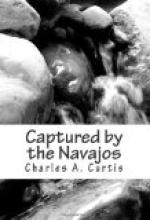At guard-mounting Captain Bayard announced that, owing to the recent fatiguing marches and the lack of good water, we would go no farther than Navajo Springs the following day, and that we would not break camp before eight o’clock.
This announcement was received with pleasure; for since leaving Agua Fria little water had been drunk, it being either muddy, stagnant, or alkaline. The water at Navajo Springs was said to be pure.
Ten o’clock next morning found us at the springs. They were fifteen in number, clustered in an area of less than an acre. Each was of the dimensions of a barrel set upon end in the ground, with a mere thread of water flowing from it—a thread which the fierce sun evaporated before it had flowed a rod from its source. It soon became plain to every one that we could not long remain there.
The Indians had said there had been a heavy rainfall at the west. Five and one-twentieth miles over a rough, red, and verdureless country brought us to the Rio Puerco of the West. There was not a drop of water in it.
The commanding officer ordered me to take ten cavalrymen, with shovels, and go on to Carizo Creek, and, if I found no running water, to sink holes in a line across its bed. The boy corporals were allowed to go with me.
The distance to Carizo was seven miles, over a high, intervening ridge, and the creek, when we reached it, was in no respect different from the one we had just left. We opened a line of holes six feet deep, but found very little water.
Sending Corporal Henry back with a message to Captain Bayard, we pushed on to Lithodendron Creek, a distance of thirteen miles, and found about an acre of water, four inches deep, in the bed of the stream, under the shadow of a sandstone cliff. It was miserable stuff—thick, murky, and warm—but it was better than nothing; I sent a soldier back to the command, and sat down with Frank under the cliff to wait.
The march had lengthened into thirty-two miles, over an exceedingly rough country, and it had been continuous, with no noonday rest, and under a broiling sun.
Frank and I sat a little apart from the soldiers, watching for the arrival of the approaching wagons.
Time dragged slowly on until after nine o’clock, when a faint “hee-haw” in the far distance gave us the first hint that the train was over the divide and that the unfailing scent of the mules had recognized the vicinity of water.
An hour more passed before Sergeant Cunningham and half a dozen privates of the infantry company marched down to the roily pool and stooped for a drink. The rest of the men were straggling the length of the train, which arrived in sections, heralded by the vigorous and continued braying of the mules.
No one felt inclined to pitch a tent, partly on account of extreme fatigue, but chiefly because the ground was rough and stony and cacti in endless variety strewed the surface, branching and clustering about the petrified trunks of giant trees which gave the creek its name.




